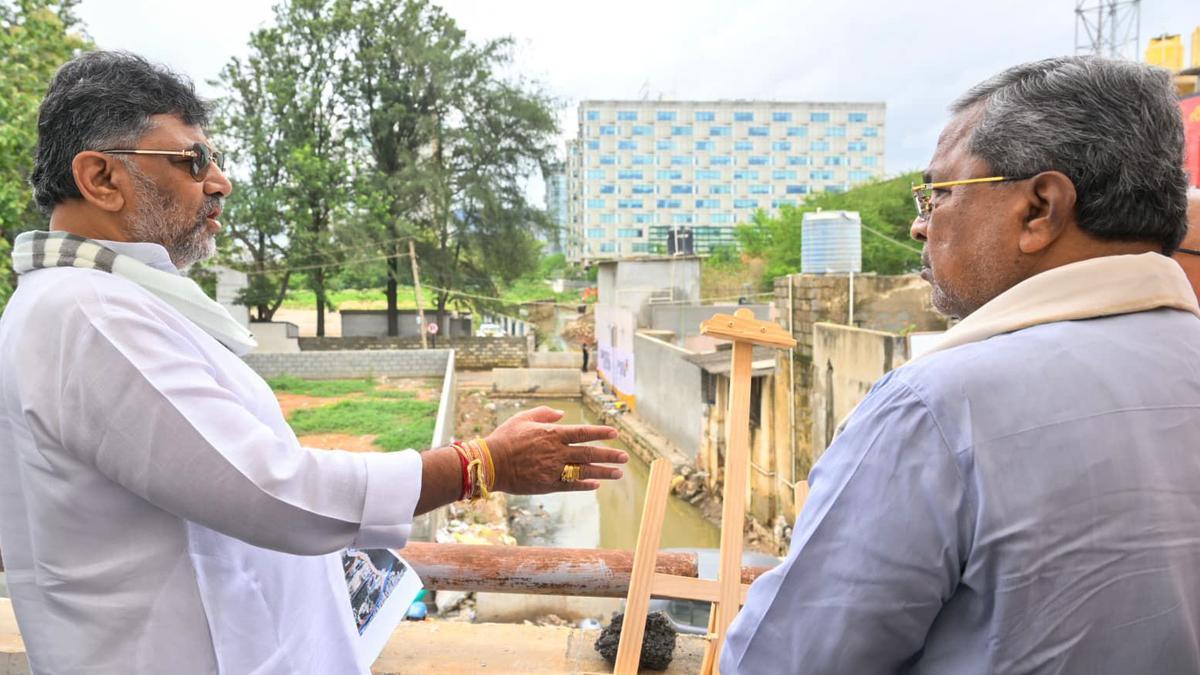October 9 marked the 128th birth anniversary of former Chief Minister M. Bhaktavatsalam (1897-1987), who was the last Congress Chief Minister of the State (1963-67). Known for fervent patriotism, self-effacement, dedication, the former Chief Minister was a stickler for rules. “He was an unsmiling person but not corrupt,” observes veteran political writer and social activist S.V. Rajadurai.
However, Bhaktavatsalam continues to be viewed adversely by sections of historians and political leaders for the way he handled the acute shortage of rice and anti-Hindi imposition agitation in the State. He is still blamed for the debacle of the Congress in the 1967 Assembly election.
Yet, one remark that he made after the declaration of results of the 1967 Assembly election, remains a subject of intense debate among the political class and students of contemporary history. The observation was this, “I see a virus has spread all over Tamil Nad[u]. I pray God may save the people.” Actually, this formed a part of his statement made exclusively to The Hindu, according to a report published on February 24, 1967. Needless to say, the outgoing CM, who graciously congratulated the DMK, stated he accepted the defeat as “the verdict of the people against the Congress.”
That the poll results stunned the Congress party was an understatement as not only the incumbent Chief Minister and most of his Cabinet colleagues were defeated but also the then all-India president of the organisation and former Chief Minister K. Kamaraj had to bite the dust. In Virudhunagar, a young student-leader P. Srinivasan of the Dravida Munnetra Kazhagam (DMK) had outsmarted Kamaraj by a margin of a little less than 1,300 votes while another DMK nominee, D. Rajarathnam, beat Bhaktavatsalam nearly by 9,000 votes in Sriperumpudur.

In an hour-long interaction with reporters at his Nungambakkam residence, the DMK chief C. N. Annadurai, who became Chief Minister on March 6, 1967, described his predecessor’s statement as “unfortunate” and sounded somewhat bitter by saying that “it is thoroughly unbecoming of him,” reported this newspaper on February 25. M. Karunanidhi, who succeeded Annadurai two years later following the latter’s death, in his memoir, Nenjukku Neethi (Volume 1) [which he originally wrote in 1975], likened Bhaktavatsalam’s observation to “one of spewing venom.”
Two days later, the outgoing CM clarified his controversial remark, which, he said, had been “misunderstood.” There was no “insinuation” in his remark against any individual or party. “What was uppermost in his mind was that there should be some introspection and that the Congress should look into its shortcomings and rectify them. All that he was concerned about was the obsession with which the body politic was seized. He did not mean any reference to the D.M.K. and that was why he used the expression ‘a virus’ and not ‘the virus’ or ‘cancer’. He said that ‘God may save the people,’ because he found that his partymen had not been able to deal with that obsession. He had in mind the shortcomings in ‘our own organisation and organisational approach.’ In fact, he had been mentioning it to his friends even before the elections,” The Hindu reported on February 28.
Three years later, in an interview to popular Tamil periodical, Kumudam, the former Chief Minister gave another clarification about what he meant by the term “virus.” This interview was published in December 1970, the contents of which were carried in Bhaktavatsalam’s memoir, Enadhu Ninaivugal, which was published in 1971. When the memoir was launched, he was on the side of the then Prime Minister Indira Gandhi, who had fallen out with senior leaders including Kamaraj. Spearheaded by Indira Gandhi, the Congress had become an ally of the DMK.
In the interview, he explained that the fact that the people had rejected the Congress, which had got freedom [from the British] for the people and strove for the welfare of the public by formulating several developmental schemes, had made him to ponder over confusion, which had engulfed the people. “I used the term – virus – only to refer to this state of confusion,” he explained.
He did not describe the DMK MLAs or the DMK as “virus.” Had it been otherwise, this would have been “contrary to my nature,” Bhaktavatsalam pointed out, recalling he had made clear his position to Annadurai, V.R. Nedunchezhian and Karunanidhi who called on him at his residence before assuming charge. Karunanidhi, who was Public Works Minister in the Annadurai’s Cabinet, told him that he and his colleagues too were initially under the wrong impression. Now, they had got clarity after the explanation.
In February 1987, Bhaktavatsalam died at the age of 89. At that time, the AIADMK’s founder M.G. Ramachandran, as Chief Minister, ensured that the former CM was given a state funeral at an exclusive spot on the premises of the Gandhi Mandapam, Guindy. Eleven years later, the DMK government had constructed a proper memorial for him at a cost of ₹25 lakh and in 1998, declaring open the memorial, the then Chief Minister Karunanidhi lauded Bhakthavatsalam for his administrative abilities. He told the audience that he learnt the basics of government administration from his predecessor, this newspaper mentioned in a report published on March 14, 1998.
He also recalled how Bhakthavatsalam, [as Finance Minister] inaugurated a mother-child care centre set up by him (Karunanidhi, who was in the Opposition then) in his native Thirukuvalai near Thiruvarur in 1962 despite stiff opposition from the local Congressmen, [an incident of which was recounted in Enadhu Ninaivugal too]. Similarly, on his release from prison in Palayamkottai, Bhakthavatsalam had called him to his residence and explained to him why he was incarcerated. When he (Karunanidhi) gave him a list of persons who were still in prison, the latter, as the Chief Minister, immediately ordered their release. These instances revealed Bhakthavatsalam’s “humane side,” the daily mentioned as Karunanidhi having said.
Bhakthavatsalam’s daughter and social activist, Sarojini Varadappan, and granddaughter Jayanthi Natarajan, who was the then Union Minister of State for Civil Aviation, attended the inauguration of the memorial.
.png)
 6 hours ago
2
6 hours ago
2







 English (US) ·
English (US) ·